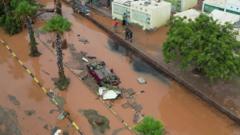The situation in Gaza is dire, as the UN reports that aid trucks entering the region have yet to distribute vital supplies, heightening international pressure on Israel amid a humanitarian crisis exacerbated by 11 weeks of blockade.
Israel Faces Intensifying Global Pressure as UN Reports No Aid Distribution in Gaza

Israel Faces Intensifying Global Pressure as UN Reports No Aid Distribution in Gaza
The UN reveals a stark halt in aid distribution in Gaza despite incoming trucks, as diplomatic tensions rise against Israel's military actions.
The article text:
The United Nations announced that no humanitarian aid has been distributed in Gaza, even as multiple aid trucks began crossing the border after an extended blockade lasting 11 weeks. On Tuesday, Israeli officials stated that 93 trucks, loaded with essentials including flour, baby food, medical supplies, and pharmaceuticals, had made it into Gaza through the Kerem Shalom crossing. However, Stephane Dujarric, the UN spokesperson, revealed that despite waiting several hours for authorization from Israel, UN teams were unable to transport the supplies into their warehouse.
Israel had agreed on Sunday to cease its aid blockade amidst warnings from global experts of a potential famine in Gaza. However, international scrutiny continues to grow against Israel. The UK has announced the suspension of trade negotiations, criticizing the military's conduct in Gaza as "morally unjustifiable", while Prime Minister Sir Keir Starmer condemned the humanitarian situation as "intolerable". Similarly, Kaja Kallas, the EU’s foreign policy chief, indicated that the bloc would reassess its trade agreements with Israel based on recent developments in the region.
Dujarric emphasized that the aid distribution operation is complicated due to Israeli procedures requiring that the UN offload supplies in Palestine before reloading them, contingent on the Israeli military's consent for UN workers to access Gaza. He described the distribution of aid as "a drop in the ocean" when an estimated 600 trucks are urgently needed each day to adequately respond to Gaza’s enduring humanitarian crisis.
UN’s humanitarian chief Tom Fletcher stressed the urgency of the situation during a BBC interview, warning that thousands of infants could perish in the next 48 hours without immediate aid. He cited critical conditions facing approximately 14,000 babies suffering from severe malnutrition, although the UN Office for the Coordination of Humanitarian Affairs later clarified that this figure related to a year-long projection.
Moreover, since the onset of the conflict following a Hamas attack on October 7, resulting in the deaths of about 1,200 Israelis, the health ministry in Gaza reported that over 53,000 individuals have died, including more than 3,300 since the resumption of Israeli military operations. Secretary of State Marco Rubio expressed approval at the beginning of aid flow, while acknowledging that the assistance provided thus far is insufficient.
In a joint statement, leaders from the UK, France, and Canada have called for an immediate halt to Israeli military actions and the urgent facilitation of humanitarian assistance into Gaza. Concurrently, the UK has moved to sanction various Israeli settlers and associated organizations in light of the escalating crisis.
The United Nations announced that no humanitarian aid has been distributed in Gaza, even as multiple aid trucks began crossing the border after an extended blockade lasting 11 weeks. On Tuesday, Israeli officials stated that 93 trucks, loaded with essentials including flour, baby food, medical supplies, and pharmaceuticals, had made it into Gaza through the Kerem Shalom crossing. However, Stephane Dujarric, the UN spokesperson, revealed that despite waiting several hours for authorization from Israel, UN teams were unable to transport the supplies into their warehouse.
Israel had agreed on Sunday to cease its aid blockade amidst warnings from global experts of a potential famine in Gaza. However, international scrutiny continues to grow against Israel. The UK has announced the suspension of trade negotiations, criticizing the military's conduct in Gaza as "morally unjustifiable", while Prime Minister Sir Keir Starmer condemned the humanitarian situation as "intolerable". Similarly, Kaja Kallas, the EU’s foreign policy chief, indicated that the bloc would reassess its trade agreements with Israel based on recent developments in the region.
Dujarric emphasized that the aid distribution operation is complicated due to Israeli procedures requiring that the UN offload supplies in Palestine before reloading them, contingent on the Israeli military's consent for UN workers to access Gaza. He described the distribution of aid as "a drop in the ocean" when an estimated 600 trucks are urgently needed each day to adequately respond to Gaza’s enduring humanitarian crisis.
UN’s humanitarian chief Tom Fletcher stressed the urgency of the situation during a BBC interview, warning that thousands of infants could perish in the next 48 hours without immediate aid. He cited critical conditions facing approximately 14,000 babies suffering from severe malnutrition, although the UN Office for the Coordination of Humanitarian Affairs later clarified that this figure related to a year-long projection.
Moreover, since the onset of the conflict following a Hamas attack on October 7, resulting in the deaths of about 1,200 Israelis, the health ministry in Gaza reported that over 53,000 individuals have died, including more than 3,300 since the resumption of Israeli military operations. Secretary of State Marco Rubio expressed approval at the beginning of aid flow, while acknowledging that the assistance provided thus far is insufficient.
In a joint statement, leaders from the UK, France, and Canada have called for an immediate halt to Israeli military actions and the urgent facilitation of humanitarian assistance into Gaza. Concurrently, the UK has moved to sanction various Israeli settlers and associated organizations in light of the escalating crisis.




















